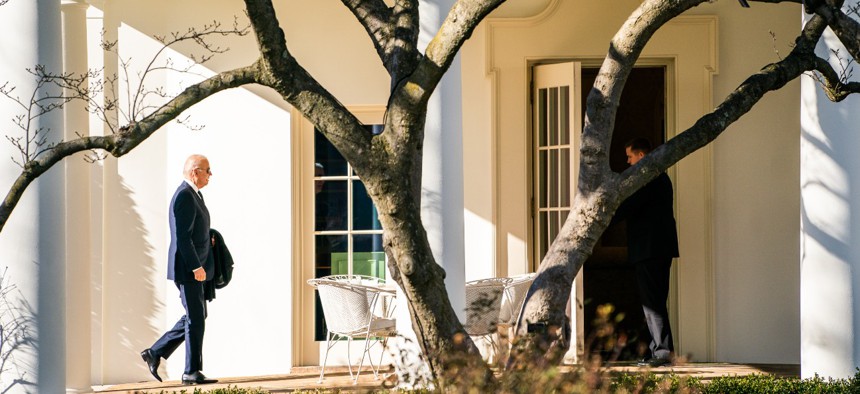
President Biden makes his way to the Oval Office on the South Lawn of the White House on January 16. Demetrius Freeman/The Washington Post via Getty Images
The Second Year of the Biden White House Brought an Uptick in ‘A Team’ Turnover
Some other high-profile departures are on the horizon, reportedly.
The Biden White House had a “significant uptick” in departures among its “A team” in its second year, after a relatively stable first year, according to a new analysis.
The study, published on the two-year anniversary of President Biden’s inauguration by Kathryn Dunn Tenpas, nonresident senior fellow for governance studies at the Brookings Institution, defines the “A team” as the 66 senior executive positions in the Executive Office of the President, which are all highly influential and have important relationships with other government officials, stakeholders and the media.
“The significant uptick in ‘A-Team’ departures moved from five individuals departing in year one to 21 in year two,” Tenpas wrote. “Though the increase itself is not surprising—all administrations but one since 1981 experienced an uptick in second year ‘A-Team’ departures—the magnitude of the increase is noteworthy.” The turnover in the second year was the second highest (32%) behind President Regan (40%), when looking at presidents Reagan through Biden.
.png)
For Biden’s second year, “of the 21 individuals contributing to the turnover figure, 17 resigned for a variety of reasons, three were promoted and one resigned under pressure (Office of Science and Technology Director Eric Lander),” Tenpas said. “This forced resignation may have been the most dramatic of the lot since he resigned, apologizing for verbal abuse of subordinates.” This was “the second [resignation] of this type under Biden.”
She said the reasons for departures varied, such as burnout, a need to move, taking a job in the private sector or promotion within the executive branch, “but departures are often the result of cumulative exhaustion (e.g., a hard-fought campaign, a contested election battle, a truncated transition and a challenging first year).”
Between White House Counsel Dana Remus and several others, there was a “significant exodus of senior lawyers in the White House Counsel’s Office.” Other big names that left were White House Press Secretary Jen Psaki, National Climate Advisor Gina McCarthy and COVID-19 Response Coordinator Jeff Zients, who is reportedly going to replace White House Chief-of-Staff Ron Klain when he departs.
News articles about the pending departures of Klain, in addition to Cecilia Rouse, chair of the Council of Economic Advisers, and Brian Deese, director of the National Economic Council, “suggest that the level of turnover will be on the rise,” according to Tenpas. “The intensified focus on politics at the cost of policy may encourage some policy-oriented staff members to move on. At the same time, those focused on political outreach (think Office of Public Engagement and Political Strategy and Outreach) often move to the reelection campaign where their political skills can serve the president well.”
CNN reported on January 19 that Biden plans to launch his reelection campaign sometime after his State of Union address on February 7 and the plans haven’t been altered by the controversy surrounding the classified documents found at his former office and residence.
When asked during the briefing on Wednesday why the White House has yet to confirm the news about Zients, White House Press Secretary Karine Jean-Pierre said, she wasn’t going to talk about an internal process from the podium and had no personnel announcements at this time.
“[Klain] has always been a pleasure to work with. And we're going to continue, clearly, to work with Ron as long as he's here,” she said. “When it comes to Jeff, I've known him, as well, for a very long time. He's a great implementer. He's great with operations. And he's also an amazing human being, which I think should matter as well.”
Zients––who left his COVID response role in April, and came back to the White House in the fall as a “special government employee” to help with staff turnover after the midterm elections, and didn’t take any compensation, according to Axios ––previously served in senior roles in the Obama administration, including director of the National Economic council and twice as acting director of the Office of Management and Budget. He was also put in charge of fixing the botched Healthcare.gov rollout.
As for Cabinet officials, none have departed yet, a stark contrast to the first few years of the Trump administration.







